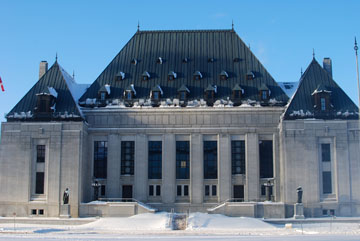This week, the Supreme Court of Canada will hear six appeals including a pair related to an RCMP pay freeze and its members’ ability to bargain collectively through unofficial channels. Issues around dramatically differing testimonies in a criminal context will also be heard.
 Feb. 17 — Alberta — Flaviano v. R.
Feb. 17 — Alberta — Flaviano v. R.
Criminal law: Vittorio Thomas Flaviano, a landlord, was acquitted of a sexual assault involving a teenage girl, allegedly committed while he was repairing a dishwasher in the rental unit. Testimony of the appellant and complainant differed dramatically at trial. The appellant argued that either the sex was consensual or that he was mistaken in believing it to be. The trial judge acquitted him on that basis. On appeal, the court agreed with the Crown’s assertion that the defence held no air of reality, and entered a conviction. A publication ban is in place.
Read the Alberta Court of Appeal’s decision
Feb. 18 — Ontario — Mounted Police Association of Ontario v. Attorney General of Canada
Charter of Rights and Freedoms: The Mounted Police Association of Ontario is an organization formed to resolve issues between RCMP officers and RCMP management in the province. RCMP regulations, however, stipulate RCMP staff can only address labour issues through the RCMP’s internal Staff Relations Representative Program. The MPAO brought an application seeking a declaration that the pertinent regulations infringe on Charter rights to collective bargaining.
Read the Ontario Court of Appeal’s decision
Related news story:
Ottawa wins appeal to block RCMP union, CBC
Feb. 19 — Federal — Meredith v. Attorney General of Canada
Charter of Rights and Freedoms: In the wake of the 2008 financial crisis, the Treasury Board decided not to grant a previously approved pay increase to RCMP staff. Robert Meredith, on behalf of RCMP staff, sought judicial review reversing the decision and a declaration it violated RCMP members’ Charter rights. The federal government shortly thereafter enacted the Expenditure Restraint Act, which specifically supported the Treasury Board’s limits on pay. Meredith then amended his review application to include a challenge of the new act’s constitutionality.
Read the Federal Court of Appeal’s decision
Related news stories:
RCMP members lobby government to reverse wage rollback, CBC
Court rebukes RCMP for allowing Mountie grievances to ‘fester,’ National Post
Feb. 20 — Quebec — Immeubles Jacques Robitaille v. City of Quebec
Municipal law: Immeubles Jacques Robitaille challenged the City of Quebec after the real estate company was issued an offence notice for having parking facilities that broke the city’s bylaws. In its challenge, Immeubles claimed rights it had acquired from the city, pleading the doctrine of estoppel. The SCC will review whether estoppel can be pleaded in these circumstances.
Read the Quebec Court of Appeal’s decision
Related news story:
Le litige sur un stationnement de la côte d’Abraham en Cour d’appel, Le Soleil
 Feb. 17 — Alberta — Flaviano v. R.
Feb. 17 — Alberta — Flaviano v. R.Criminal law: Vittorio Thomas Flaviano, a landlord, was acquitted of a sexual assault involving a teenage girl, allegedly committed while he was repairing a dishwasher in the rental unit. Testimony of the appellant and complainant differed dramatically at trial. The appellant argued that either the sex was consensual or that he was mistaken in believing it to be. The trial judge acquitted him on that basis. On appeal, the court agreed with the Crown’s assertion that the defence held no air of reality, and entered a conviction. A publication ban is in place.
Read the Alberta Court of Appeal’s decision
Feb. 18 — Ontario — Mounted Police Association of Ontario v. Attorney General of Canada
Charter of Rights and Freedoms: The Mounted Police Association of Ontario is an organization formed to resolve issues between RCMP officers and RCMP management in the province. RCMP regulations, however, stipulate RCMP staff can only address labour issues through the RCMP’s internal Staff Relations Representative Program. The MPAO brought an application seeking a declaration that the pertinent regulations infringe on Charter rights to collective bargaining.
Read the Ontario Court of Appeal’s decision
Related news story:
Ottawa wins appeal to block RCMP union, CBC
Feb. 19 — Federal — Meredith v. Attorney General of Canada
Charter of Rights and Freedoms: In the wake of the 2008 financial crisis, the Treasury Board decided not to grant a previously approved pay increase to RCMP staff. Robert Meredith, on behalf of RCMP staff, sought judicial review reversing the decision and a declaration it violated RCMP members’ Charter rights. The federal government shortly thereafter enacted the Expenditure Restraint Act, which specifically supported the Treasury Board’s limits on pay. Meredith then amended his review application to include a challenge of the new act’s constitutionality.
Read the Federal Court of Appeal’s decision
Related news stories:
RCMP members lobby government to reverse wage rollback, CBC
Court rebukes RCMP for allowing Mountie grievances to ‘fester,’ National Post
Feb. 20 — Quebec — Immeubles Jacques Robitaille v. City of Quebec
Municipal law: Immeubles Jacques Robitaille challenged the City of Quebec after the real estate company was issued an offence notice for having parking facilities that broke the city’s bylaws. In its challenge, Immeubles claimed rights it had acquired from the city, pleading the doctrine of estoppel. The SCC will review whether estoppel can be pleaded in these circumstances.
Read the Quebec Court of Appeal’s decision
Related news story:
Le litige sur un stationnement de la côte d’Abraham en Cour d’appel, Le Soleil







